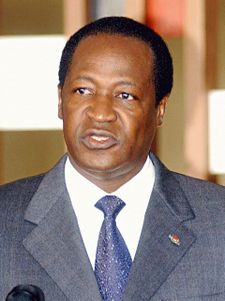Blaise Compaoré
| Blaise Compaoré | |
 |
|
|
President of Burkina Faso
|
|
|---|---|
| Incumbent | |
| Assumed office 15 October 1987 |
|
| Prime Minister | Youssouf Ouédraogo Roch Marc Christian Kaboré Kadré Désiré Ouedraogo Tertius Zongo |
| Preceded by | Thomas Sankara |
|
|
|
| Born | 3 February 1951 Ouagadougou, Upper Volta |
| Political party | CDP |
| Spouse(s) | Chantal Compaoré |
| Religion | Roman Catholic |
Blaise Compaoré (born February 3, 1951[1][2]) has been the President of Burkina Faso since 1987. He is the founder of the ruling political party, the Congress for Democracy and Progress. He has been implicated in the murder of Thomas Sankara, his predecessor, in the 1987 coup. He was elected President in 1991, in an election that was boycotted by the opposition; he was re-elected in 1998 and 2005.
Contents |
1991 and 1998 elections
Compaoré was elected president in 1991; main opposition parties boycotted in protest to the questionable means Compaoré used to take office in the first place, surrounding the murder of Sankara. In this election, only 25% of the electorate even participated, emphasizing tremendous political instability and protest amongst the masses. In 1998 he was re-elected for the first time. In August 2005, he announced his intention to contest the next presidential election. Opposition politicians regard his 2005 re-election bid as unconstitutional due to a constitutional amendment in 2000 limiting a president to two terms, and reducing term lengths from seven to five years, thus barring Compaoré from seeking a third term. Compaoré's supporters disputed this, saying that the amendment could not be applied retroactively.[3] Notwithstanding opposition objections, in October 2005 the constitutional council ruled that because Compaoré was a sitting president in 2000, the amendment would not apply until the end of his second term in office, thereby allowing him to present his candidacy for the 2005 election.
2005 election
On November 13, 2005, Compaoré was re-elected as President, defeating 12 opponents and winning 80.35% of the vote. Although 16 opposition parties announced a coalition to unseat Compaoré early on in the race, ultimately nobody wanted to give up their spot in the race to another leader in the coalition, and the pact fell through.He has proposed a "National Reconciliation" that is not widely supported by his opposition.
Following Compaoré's victory, he was sworn in for another term on December 20, 2005.[4]
International and regional roles
In 1993, President Compaoré headed the Burkina-Faso delegation which participated in the first Tokyo International Conference on African Development.[5]
Compaoré has been active as a mediator in regional issues. On July 26, 2006, he was designated as the mediator of the Inter-Togolese Dialogue, which was held in Ouagadougou in August 2006[6] and resulted in an agreement between the government and opposition parties.[7] He has also acted as mediator in the crisis in Côte d'Ivoire, brokering the peace agreement that was signed by Ivorian President Laurent Gbagbo and New Forces leader Guillaume Soro in Ouagadougou on March 4, 2007.[8]
He is an Honorary Member of The International Raoul Wallenberg Foundation.
Views on abstinence, AIDS and NGOs
In an interview with the magazine Famille Chrétienne, President Compaoré asserted that the notion of sexual abstinence was not a monopoly of the Roman Catholic Church and that European NGOs who disagreed with traditional morality were profiting from the situation in order to intervene in regional African affairs.[9]
References
- ↑ Profiles of People in Power: The World's Government Leaders (2003), page 76–77.
- ↑ "Biographie du président", website of the Presidency (French).
- ↑ "BURKINA FASO: Compaore's decision to bid for re-election raises opposition hackles", IRIN, August 11, 2005.
- ↑ "Mme Brigitte Girardin a représenté la France à la cérémonie d’investiture de M. Blaise Compaoré (Ouagadougou, 20 décembre 2005)", French Ministry of Foreign Affairs (French).
- ↑ Japan, Ministry for Foreign Affairs (MOFA): 28 African nations
- ↑ "Inter-Togolese dialogue resumes in Ouagadougou", republicoftogo.com (nl.newsbank.com), August 9, 2006.
- ↑ "TOGO: Political agreement aims to end 12-year feud ", IRIN, August 21, 2006.
- ↑ "COTE D'IVOIRE: New peace agreement", IRIN, March 5, 2007.
- ↑ Famille Chrétienne
See also
- Tokyo International Conference on African Development (TICAD-IV), 2008.
- Patron of the International Telecommunication Union's Global Cybersecurity Agenda.
External links
- Web Thomas Sankara
- Pascal Drouhaud interviews Blaise Compaoré
- Reporters Without Borders, Burkina Faso 2004 Annual Report
- IFEX: Monitoring media freedom in Burkina Faso
| Political offices | ||
|---|---|---|
| Preceded by Thomas Sankara |
President of Burkina Faso 1987 – present |
Incumbent |
| Preceded by Dawda Jawara |
Chairman of the Economic Community of West African States 1990 – 1991 |
Succeeded by Dawda Jawara |
| Preceded by Mamadou Tandja |
Chairman of the Economic Community of West African States 2007 – 2008 |
Succeeded by Umaru Yar'Adua |
| Preceded by Robert Mugabe |
Chairperson of the African Union 1998 – 1999 |
Succeeded by Abdelaziz Bouteflika |
|
|||||
|
|||||